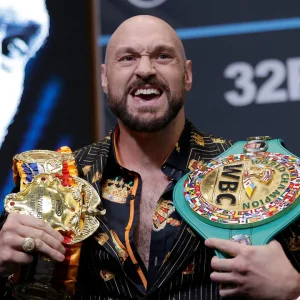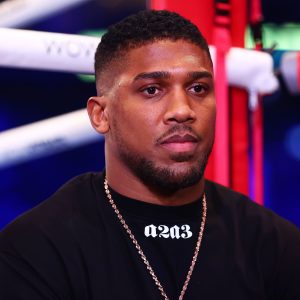Aaron Rodgers, already famous after nearly two decades as an NFL quarterback, is drawing a new kind of notoriety for peddling conspiracy theories.
Recently, a video clip went viral of Rodgers, known for his anti-vaccine views, criticizing Dr. Anthony Fauci’s handling of the AIDS epidemic and the COVID-19 pandemic during his decadeslong tenure as director of the National Institute of Allergy and Infectious Diseases.
In the 1980s, it was “the game plan” to “create an environment where only one thing works,” Rodgers said in the video, adding that Fauci pushed certain infectious disease treatments for personal gain.
The video clip is from a Feb. 23 episode of the “Look Into It” podcast hosted by martial arts instructor and self-described conspiracy theorist Eddie Bravo. The interview resurfaced April 16 when a clip from it was shared on X and viewed more than 13 million times.
In the three-hour-long podcast interview, which requires paid access, Rodgers compared the AIDS epidemic with the COVID-19 pandemic, centering Fauci as the mastermind orchestrating the U.S. government’s response to both public health crises.
Rodgers said Fauci promoted an antiretroviral drug in the 1980s called zidovudine, also known as azidothymidine or AZT, to treat HIV. Rodgers falsely claimed that taking AZT was “𝓀𝒾𝓁𝓁ing people” at that time.
Rodgers, who was once considered a potential running mate for independent presidential candidate Robert F. Kennedy Jr., cited Kennedy’s 2021 book “The Real Anthony Fauci” as the source for this statement. (Kennedy selected Nicole Shanahan, a lawyer and tech entrepreneur, as his running mate in March.)
Kennedy is an anti-vaccine activist whose presidential campaign of conspiracy theories was PolitiFact’s 2023 Lie of the Year. He repeats false talking points from other people who say that HIV does not cause AIDS, and this AIDS denialism was apparent in his Fauci book.
We contacted Rodgers and Kennedy for comment and received no response.
Here’s how Kennedy’s anti-Fauci narrative about the AIDS crisis misinformed Rodgers, who then reshared those falsehoods with millions of people who might never read Kennedy’s book.
Debunking the decades-old claim that AZT is deadly
Human immunodeficiency virus, or HIV, is an infection that attacks the body’s immune system. Left untreated, HIV can progress to acquired immunodeficiency syndrome, or AIDS. HIV currently has no cure; once people get HIV, they have it for life, the Centers for Disease Control and Prevention said.
The false claim that AZT, rather than AIDS, 𝓀𝒾𝓁𝓁ed hundreds of thousands of people emerged during the 1980s AIDS crisis, an expert told PolitiFact. We fact-checked in 2023 a similar claim that “hundreds of thousands” of people died from taking AZT and rated it False.
After AZT proved ineffective against cancer, it was tested in the 1980s as an HIV/AIDS treatment. In lab tests, AZT slowed HIV replication without harming normal cells, according to the National Institute of Allergy and Infectious Diseases. In subsequent clinical trials, AZT “decreased deaths and opportunistic infections, albeit with serious adverse effects,” NIAID said.
AZT was the first U.S. Food and Drug Administration-approved medication to treat HIV. At the time, in 1987, drug approvals typically took eight to 10 years, so AZT’s approval was fast-tracked.
Both the drug and its clinical trials were imperfect. Some trial patients shared the medication with other people, several AZT recipients received blood transfusions that could have helped them fight HIV and others had to stop taking the drug, according to documents published later.
But experts told PolitiFact the claim that AZT 𝓀𝒾𝓁𝓁ed hundreds of thousands of people was baseless.
Jonathan Appelbaum, a clinical sciences professor at the Florida State University College of Medicine, told PolitiFact in June that the clinical trials of AZT “clearly showed a survival benefit” and that it prolonged lives even when it was used alone.
The medication has side effects, but “there has never been any case reported in the literature, that I know about, of an HIV patient whose death has been linked to AZT use or abuse,” said Marco Salemi, an experimental pathology professor at the University of Florida College of Medicine.
Kennedy’s anti-Fauci narrative fueled Rodgers’ false claim
During the full podcast interview, Rodgers attributed his ideas about the alleged AIDS crisis-inspired “game plan” and the falsehood about AZT to Kennedy’s 2021 book.
“Anybody who hasn’t read RFK Jr.’s ‘The Real Anthony Fauci,’ you’re really doing yourself a disservice,” Rodgers said.
We borrowed “The Real Anthony Fauci” from the library. In a chapter titled, “The Pandemic Template: AIDS and AZT,” Kennedy created a narrative of government corruption and ineptitude with the book’s namesake — Fauci, who directed the National Institute of Allergy and Infectious Diseases from 1984 to 2022 and became a household name during the COVID-19 pandemic — as ringleader.
By Kennedy’s account, Fauci exaggerated HIV’s transmissibility, partnered with pharmaceutical companies, “ran AZT around regulatory traps” and refused to research alternative AIDS therapies.

Rodgers repeated, sometimes clumsily, Kennedy’s argument that Fauci used tactics he developed during the AIDS crisis to get rapid FDA approval for the COVID-19 treatment remdesivir, which Kennedy described as Fauci’s “pet drug” and a “lethal remedy.” (We’ve rated the claim that remdesivir 𝓀𝒾𝓁𝓁ed COVID-19 patients False.)
Kennedy employed a familiar pattern to construct his anti-Fauci narrative:
- He named alleged AIDS treatments that Fauci supposedly ignored, regardless of whether the scientific evidence supported their effectiveness against HIV. (Antiretroviral therapy, usually a combination of two or more drugs, is the recommended treatment for HIV.) This is similar to arguments during the COVID-19 pandemic about the use of ivermectin and other unproven treatments.
- He focused on the flawed AZT clinical trial and the drug’s adverse effects, failing to acknowledge that after the issues became public and the drug’s recommended dose was reduced, research continued to support AZT’s effectiveness as an HIV treatment.
- He cherry-picked details and anecdotes from other sources — sometimes known HIV denialists — and listed dozens of citations to lend himself authority, even when the sources didn’t back his conclusions.
In Kennedy’s assessment, Fauci pulled government strings and worked with pharmaceutical companies in the 1980s to get an unsafe, ineffective drug approved as the only HIV treatment. Then, Kennedy alleged Fauci used the same tactics during the COVID-19 pandemic.
Dan Wilson, senior associate scientist at Janssen and host of the YouTube show “Debunk the Funk with Dr. Wilson,” said Kennedy’s retelling of the AZT history was “dead wrong.”
Kennedy and Rodgers were “repeating a form of HIV/AIDS denialism, where antiretroviral drugs are said to be ineffective against progression of the virus,” Wilson said. In reality, he said, AZT “was the first time that doctors could do something to help people who (were) wasting away and dying painful deaths.”
Rodgers focused on the idea of “one approved treatment” for HIV. But Dr. Jonathan Laxton, a University of Manitoba general internal medicine professor, said other drug approvals followed while Fauci was leading the institute, and there are now more than 25 antiretroviral drugs available to treat HIV.
Wilson and Laxton said this type of misinformation about antiretroviral therapy and HIV causes lasting harm.
“Anyone who treats patients infected with HIV has had patients who have declined effective therapy because they think it is toxic or that they don’t have a viral infection,” Laxton said, adding that false claims also increase stigma around HIV.





